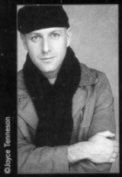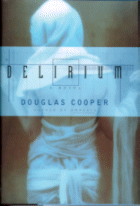Interview with Douglas Cooper
by Claire E. White
Douglas Cooper was born and raised in Toronto. He received an M.A. in philosophy, and was a prize-winning student of architecture before dropping out to concentrate on his writing. His first novel, Amnesia, was a bestseller in Canada, and critically acclaimed in the U.S. It established Cooper as a writer of architectural fiction, and he has since collaborated with some of the world's most important architects, including Diller+Scofidio and Peter Eisenman. Indigestion, a laser disc installation scripted for Diller+Scofidio, has toured the world; it was shown in Japan, Belgium, Norway, and the Barbican in London.

|
What inspired you to write Delirium?
Philip Johnson, America's most powerful architect, has said on a number of occasions: "I am a whore." Wondering what Johnson might have meant by this, I began to investigate his life, and discovered that Johnson was, amongst other things, a Nazi sympathizer. Based on this biographical information, I decided to tell the story of Mary Magdalene -- the archetypal whore who is redeemed -- and to twist this story together with that of a Johnson-like architect: the whore who remains unredeemed. It seemed to me that this architect, were he aware that a biography was about to reveal the sordid details of his past affiliations, might well contemplate murdering the biographer.
How did Delirium come to be serialized on the Web?
For years I have been represented as a screenwriter by The William Morris Agency. When my agent's assistant switched over to the new media department, she insisted that her new boss sign me as well. Since I now had an agent for new media, it became necessary to conceive of a project: I proposed that I serialize my next novel on the Internet. William Morris arranged for me to meet a producer at Time Warner Electronic Publishing (Pathfinder); they showed me Mosaic, which was newly launched, and introduced me to the idea of the Web; and I convinced them to host Delirium.
What was the most challenging aspect of serializing your novel online?
As with any new medium, figuring out an appropriate structure always proves difficult. The Web in particular, with its forking paths, can quickly make a narrative structure unwieldy. After a few months of experimentation, I decided to limit the story to four parallel story strands, connected by a navigational page.
What kind of feedback did you get from your serialization of the novel on the Internet?
We had a bulletin board on Pathfinder, but it was rarely operational. When it was, I'd receive comments, but most seemed to concentrate on design and navigation; rarely did anyone comment on the text. I did however hear from journalists and critics: Delirium was reviewed on various Web sites and search engines, and the project was written about in various magazines, including Mondo 2000, Wired UK, Rolling Stone and Esquire Japan. The reviews were generally excellent, except for a couple of hypertext partisans, who were upset that I decided to neglect this capability of the Web.
What was your inspiration for Ariel Price? Were there any difficulties in creating and writing about this character?
 Click here for ordering information. |
Another important character in the book is the biographer Theseus Crouch. Crouch's motives for writing the proposed biography of Price are far from pure. Who or what was your inspiration for Theseus Crouch?
Crouch is the embodiment of our prurient age. He personifies the vulgar modern tendency -- exemplified perhaps best by Kenneth Starr -- to treat the private life with contempt. Theseus Crouch shares attributes with various second-rate biographers, or "pathographers" as they're more properly called: elevated gossip-mongers. It's important to stress that Crouch looks *nothing* like Franz Schulze, the fine scholar who wrote biographies of both Johnson and Mies. Delirium's ultimate form is a dance of death between Ariel Price, who has ruined the public space, and Theseus Crouch, who has raped the private.
I understand that Amnesia and Delirium are part of a proposed four book series. Tell us about the next installment.
Aphasia, the third book, is being written with the aid of voice recognition software; I am dictating to the computer. It will be a critique of economism, of the tendency to reduce all aspects of life to economic categories. I will tell the story of a businessman whose obsession with the market causes him to transcend capitalism, to become a sort of meta-capitalist saint. The fourth book, Remission, deals with the Renaissance notion of the Ideal City.
One of the themes in Delirium (and Amnesia as well) is that of how modern architecture has failed in various ways. Where did it go wrong?
Arrogance. The denial of humanism and the human scale. When individual geniuses decided that they had the capacity to design whole cities, they generally produced monstrosities; the modernists were at their best with individual buildings, often small houses.
What trends in architecture today do you feel have artistic and practical significance?
I remain intrigued by conceptual architects -- Libeskind, Diller+Scofidio -- and rigorous minimalists. Tadao Ando is producing some of the most beautiful small buildings today, as are Herzog and Demeuron. The scaling back of architectural ambition is resulting in small, considered masterpieces. Some of them unbuilt.
What kind of moral duty does an architect owe to the people who will ultimately inhabit his buildings? Does he have a duty to them at all?
He or she has a duty to present clients with beautiful, livable spaces. Preferably intelligent. An architect unwilling to do this ought not to build. (An option, by the way.)
New media is the new frontier for artists as they explore new ways to communicate with their audiences. What does the new media provide to artists and writers that traditional formats do not?
It's not yet clear. Certainly the new media presents new conceptual structures, and vastly improves the possibility of dissemination and distribution. I don't think we yet know what artistic forms the media will take. Most of what has been produced on the Web, for instance, is not that interesting.
How Net-savvy do artists and writers need to be to participate in the Electronic Revolution?
Not very. I tend to favor a division of labor:
| "Crouch is the embodiment of our prurient age. He personifies the vulgar modern tendency -- exemplified perhaps best by Kenneth Starr -- to treat the private life with contempt." |
Who, in your opinion, are some of the real innovative artists who are using new media today?
Gary Hill. Liz Diller + Ricardo Scofidio. jody.org. David Rokeby. Bill Viola (although his aesthetic is controversal; I find that when he steers clear of overt New Age symbolism, his work is powerful).
What ultimately will be the effect of new media - will it bring people closer together or will it just create millions of isolated souls all communicating via cyberspace?
Both. As did the telephone.
Let's talk about Toronto. You have some pretty harsh words for the city in Delirium. What's happening to artistic and architectural integrity in Canada?
Artistic integrity remains strong (arguably much stronger than here in America). The lack of architectural integrity is not a Canadian, but rather a modern disease; Toronto is no worse than dozens of soulless American cities. I happen to concentrate on Toronto because it is my personal landscape.
I'm going to ask you see into the future. It's 2020. How does the average person read a novel: the Web, books, a Palm Pilot-type device?
Books, primarily. Although I can imagine a Palm-Pilot-like device gaining popularity; it will require a paper-white screen, properly lit, with legible black type in high resolution. We're very close to achieving this. But the book is excellent technology, and will be around for a long, long time.
Is there a legitimate literary audience on the Web yet?
Judging from the success of amazon.com, I would say yes.
With the recent trends in publishing to cut many mid-list authors to concentrate on potential "blockbusters" (who some say are actually written by formula), many aspiring novelists are pretty discouraged. As a successful literary novelist, what is your advice to the aspiring literary writer hoping to be published today?
I'm not sure than it is any more difficult than it has ever been. Literary novelists are not "mid-list" writers, by the way; we are an entirely separate category. Nobody *expects* us to write blockbusters; if we cross over into commercial success, it is a fortuitous event, and rare. Any publisher with a soul (and most have one) will support literary fiction. My advice to an aspiring literary writer? Try to write without concerning yourself overly with the mechanics of the marketplace; the industry is deeply corrupting.
You've lived all over the world, yet chose New York City as a home base. What is it about New York that inspires you to write?
Urban density, what Rem Koolhaas calls "the culture of congestion." I like that this city is so dense with lives that every question becomes
| "My advice to an aspiring literary writer? Try to write without concerning yourself overly with the mechanics of the marketplace; the industry is deeply corrupting." |
Who are some of the writers that have influenced or inspired you over the years?
Nabokov, Dostoevsky (whom N. loathed), Borges (whom N. thought pretentious), Poe. Cormac McCarthy, Denis Johnson, William T. Vollman. Pirandello, Beckett, Handke. Mamet, Judith Thompson, Ondaatje. Dylan Thomas, Hopkins.
When you hit a snag in your work creatively, what do you do to recharge your artistic batteries?
Drink, whine, engage in promiscuous artistic behavior: genre abuse.
You've been banished to a desert island. You can take three books, three CDs and a CD player with you. What books and CDs do you take?
 Traditionally you're not allowed to bring the Bible or the Complete Works
of Shakespeare. So...
1. Plato, Republic (the Loeb classic, since my Greek is lousy). 2.
Yeats, the Complete Poems. 3. Nabokov, Pale Fire.
Traditionally you're not allowed to bring the Bible or the Complete Works
of Shakespeare. So...
1. Plato, Republic (the Loeb classic, since my Greek is lousy). 2.
Yeats, the Complete Poems. 3. Nabokov, Pale Fire.
1. Beethoven's Fidelio (the Klemperer recording with Vickers). If I can't have the complete box set, I'll take the disc with excerpts. 2. The Bach B Minor Mass (if I can find a decent copy on one disc; otherwise Beethoven's Missa Solemnis). 3. Callas, La Divina, Volume One. (cheesy, I know, but what can you do...).
God, what a depressing thought.
Return to the April 1998 issue of The IWJ.
More from Writers Write
